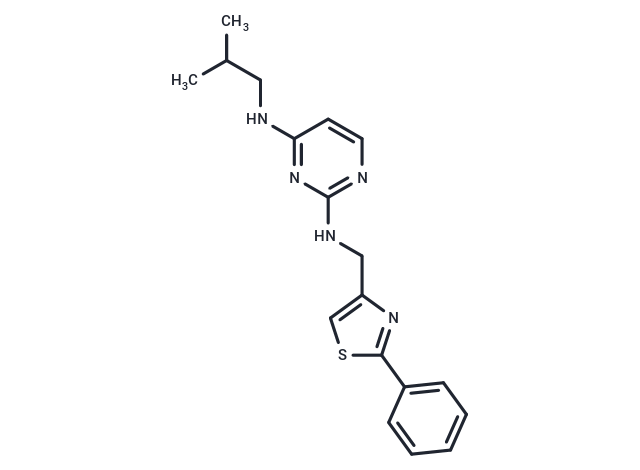 您的购物车当前为空
您的购物车当前为空
KHS 101
一键复制产品信息产品编号 T4968Cas号 1262770-73-9
KHS 101 是一种新型转化酸性卷曲螺旋蛋白 3 (TACC3) 的抑制剂。它是神经元分化的选择性诱导剂。

KHS 101
一键复制产品信息产品编号 T4968Cas号 1262770-73-9
KHS 101 是一种新型转化酸性卷曲螺旋蛋白 3 (TACC3) 的抑制剂。它是神经元分化的选择性诱导剂。
| 规格 | 价格 | 库存 | 数量 |
|---|---|---|---|
| 1 mg | ¥ 382 | 现货 | |
| 5 mg | ¥ 900 | 现货 | |
| 10 mg | ¥ 1,380 | 现货 | |
| 25 mg | ¥ 2,200 | 现货 | |
| 50 mg | ¥ 3,400 | 现货 | |
| 100 mg | ¥ 4,930 | 现货 |
大包装 & 定制
加入购物车
TargetMol 的所有产品仅用作科学研究或药证申报,不能被用于人体,我们不向个人提供产品和服务。请您遵守承诺用途,不得违反法律法规规定用于任何其他用途。
KHS 101 相关产品
更多
FGFR1 alpha (IIIc) Protein, Human, Recombinant (His & Avi), BiotinylatedFGFR3 Protein, Human, Recombinant (alpha IIIb, His)FGFR2 Protein, Human, Recombinant (alpha IIIb, hFc)FGFR2 Protein, Human, Recombinant (His & hFc)FGFR1 Protein, Human, Recombinant (His)FGFRL1 Protein, Mouse, Recombinant (His)FGFR4 Protein, Human, Recombinant (His)FGFR3 Protein, Human, Recombinant (His)FGFR3 Protein, Human, Recombinant (hFc)FGFR2 Protein, Human, Recombinant (aa 1-378, His)FGFR1 Protein, Human, Recombinant (beta (IIIb), His)FGFR1 Protein, Human, Recombinant (alpha (IIIb), His)
更多 产品介绍
生物活性
化学信息
| 产品描述 | KHS101 is a novel inhibitor of transforming acidic coiled-coil protein 3 (TACC3). It is a selective inducer of neuronal differentiation. |
| 体外活性 | KHS101能够依赖剂量增加贴壁培养大鼠神经前体细胞(NPCs)的神经分化(EC50约1μM)。使用KHS101诱导的神经元形成(在1.5-5μM KHS101条件下,40-60%的TuJ1+细胞)也在来源于成年大鼠海马和侧脑室(SVZ)的二代神经球体形成条件下观察到[2]。SMMC-7721和SK-Hep-1细胞在不同浓度的KHS101(分别为40μM和20μM)中培养,以确定IC50值。与对照(DMSO)处理相比,KHS101处理后球体的数量和大小显著减少。球体形成依赖于KHS101的浓度。在KHS101存在下,Bmi1、c-Myc和Nanog的表达均降低。与对照(DMSO)相比,KHS101降低了p-AKT、p-GSK3β和β-catenin的表达,以及下游标志物c-Myc和cyclin D1的表达[2]。 |
| 体内活性 | 6 mg/kg KHS101(静脉注射和皮下注射)的剂量产生了合理的血浆浓度(>1.5 μM),血浆半衰期为1.1-1.4小时,皮下给药后的相对生物利用度为69%。最为重要的是,KHS101在大脑中的分布非常广泛,这一点通过脑-血浆AUC(0-3h)比率约为8(给药:3 mg/kg KHS101,静脉注射)[1]得到了证明。 |
| 激酶实验 | NPC lysate was prepared by sonication in PBS and protein samples were prepared at a concentration of 2 mg/mL. The benzophenone-KHS101 compound (KHS101-BP, 5 μM) was added to 50 μL of the proteome reaction with and without unlabeled compound (250 μM). Irradiation was for 1 h using a hand-held UV lamp at long wavelength (365 nm), and subsequently, a copper-catalyzed azide-alkyne cycloaddition reaction was performed. After incubation for 1 h at RT, proteins were precipitated using trichloroacetic acid and resuspended in isoelectric focusing sample buffer. 2D SDS/PAGE was performed using ReadyStripe IPG stripes following the manufacturer's protocol [1]. |
| 细胞实验 | Rat NPCs were derived and cultured as described previously by others. After hippocampal cell isolation, the number of dissociated cells was determined and ~5 × 10^5 cells were plated in 60-mm uncoated plates. After overnight incubation (37 °C, 5% CO2, and 95% humidity), the medium was changed and the cells were expanded and maintained in an undifferentiated state on polyornithine- (10 μg/mL in water) and laminin-coated (5 μg/mL in PBS;) dishes in DMEM/F12 supplemented with N2 and basic fibroblast growth factor (bFGF, 20 ng/mL;). For KHS101 and shRNA-induction experiments, early passage cells (passaged no more than six times after hippocampal isolation) were trypsinized and plated at a density of ~1,000 cells/cm2 into N2 medium (DMEM/F12 supplemented with N2) containing KHS analogs (e.g., KHS101, KHS92, and NP; SI Text) at different concentrations (0.5–5 μM) or DMSO (0.1%), RA (1–2 μM), BDNF (100 ng/mL), and/or BMP4 (50–100 ng/mL) for 4 d [1]. |
| 动物实验 | To investigate the pharmacokinetic properties of KHS101, male Sprague–Dawley rats were administered 3 mg/kg KHS101 i.v. or s.c. One rat was killed per time point at 5 min, 40 min, 1 h, and 3 h after dosing, and samples of blood (100 μL) and whole brains were collected. In a separate study, rats were administered 6 mg/kg KHS101 i.v. or s.c. Five blood samples of 100 μL each were collected serially via a jugular vein catheter at 2 min (i.v. only), 0.5 h (s.c. only), and 1, 3, 7 and 24 h after dosing. Plasma and homogenized whole brain samples were analyzed by liquid chromatography-tandem mass spectrometry (LC-MS/MS). To study neuronal differentiation upon KHS101 administration in vivo, adult Fisher 344 rats (~10 wk old) received s.c. injections of 6 mg/kg KHS101 or vehicle control (5% ethanol in 15% Captisol). All rats received one daily i.p. injection of 200 mg/kg BrdU for 6 consecutive days after the first day. After 14 d, the animals were killed and perfusion fixed, and the brains were removed and subjected to immunohistochemical analysis [1]. |
| 分子量 | 339.46 |
| 分子式 | C18H21N5S |
| CAS No. | 1262770-73-9 |
| Smiles | C(NC=1N=C(NCC(C)C)C=CN1)C=2N=C(SC2)C3=CC=CC=C3 |
| 密度 | 1.241 g/cm3 (Predicted) |
储存&溶解度
| 存储 | Pure form: -20°C for 3 years | In solvent: -80°C for 1 year | Shipping with blue ice/Shipping at ambient temperature. | ||||||||||||||||||||||||||||||||||||||||
| 溶解度信息 | Ethanol: 15 mg/mL (44.19 mM), Sonication is recommended. DMSO: 60 mg/mL (176.75 mM), Sonication is recommended. | ||||||||||||||||||||||||||||||||||||||||
溶液配制表 | |||||||||||||||||||||||||||||||||||||||||
Ethanol/DMSO
DMSO
| |||||||||||||||||||||||||||||||||||||||||
计算器
体内实验配液计算器
请在以下方框中输入您的动物实验信息后点击计算,可以得到母液配置方法和体内配方的制备方法:
剂量转换
对于不同动物的给药剂量换算,您也可以参考 更多
引用文献
评论列表
Related Tags: buy KHS 101 | purchase KHS 101 | KHS 101 cost | order KHS 101 | KHS 101 chemical structure | KHS 101 in vivo | KHS 101 in vitro | KHS 101 formula | KHS 101 molecular weight




 很棒
很棒

 |
|
评论内容